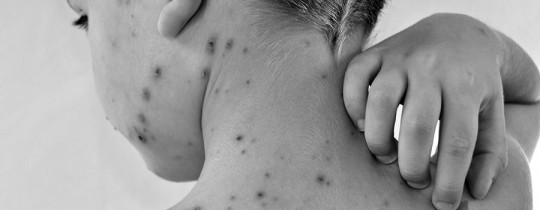Chicken Pox

The varicella zoster virus causes chicken pox, which is a highly contagious disease. The virus causes an infection in the immune system before developing into chicken pox. It is an airborne disease, and spreads very easily. Infected individuals can spread the disease through sneezing or coughing or direct contact with lesions from the rash. The disease creates a very itchy skin rash on the body, which eventually blisters before scabbing and healing. A person infected with chicken pox carries the virus a few days before the rash appears, and remains contagious for about a week (until all the lesions have scabbed). People of all ages are susceptible to chicken pox, although most cases occur before the teenage years. Anyone who has had the disease is usually immune for life, although they can still get shingles, another form of the infection.
Symptoms
Early symptoms of the virus are a headache, loss of appetite, nausea and aching muscles. This is followed by the rash and a low-grade fever. Once the rash appears, the disease has started. In children however, typically only the rash appears. The rash begins with small red dots appearing on the scalp, torso, face, legs and arms. It eventually progresses to small bumps and blisters, which are extremely itchy. Eventually the blisters turn into scabs, which is a sign the infection is nearly cured. All three stages (red bumps, blisters, and scabs) can appear on the body at once, however. In some cases, painful ulcers can appear in the throat and mouth. Chicken pox is not a fatal disease, although it is significantly more severe for adult males than it is for children or adult females.
Causes
The varicella zoster virus can be spread through the air or through direct contact with a blister on an infected person. It spreads in a similar way that the flu does. It is an extremely contagious disease. 90% of people become infected because of contact with the virus. The symptoms of chicken pox don’t appear right away. Once someone is infected, the virus incubates for approximately two weeks before a rash appears. There are no symptoms during the incubation period, and a person doesn’t become contagious until a few days before the symptoms appear. They remain contagious until there are no more blisters.
Prevention
The spread of chicken pox can be prevented by isolating the affected individual. Because it is a disease which is spread primarily through contact, limiting or eliminating the contact with the infected person is the best way to prevent infection. In 1995, a vaccine became available in the United States. Some countries even require children to take this vaccine before entering elementary school. In the United States, the varicella vaccine is now part of the typical routine immunization schedule for children. The vaccine is also recommended for healthcare workers, teachers, and others who may have to come into contact with the disease due to their employment. To become fully vaccinated, children over 12 and adults need two doses of the vaccine given 4-8 weeks apart. For children younger than 12, two doses need to be given 3 months apart. The website Lab Tests Online gives some information on chicken pox and shingles tests, which can help you differentiate between the diseases.
Treatment
Since chicken pox typically lasts approximately a week, most patients simply suck it up and deal with the infection. There are some treatment options available however, for those that want it. Some non-medical therapy includes: baths with soap and water to limit any bacterial infections that may occur with the blisters; cool water on the affected areas to limit itchiness; or using calamine lotion on affected areas. Using acetaminophen like Tylenol or Motrin can help with painful mouth blisters and headaches. Preventing scratching is the number one goal for patients. Scratching can create bacterial infections. All patients should have their nails trimmed short or wear gloves to help prevent scratching, along with skin lotions that can be applied on the blisters.
